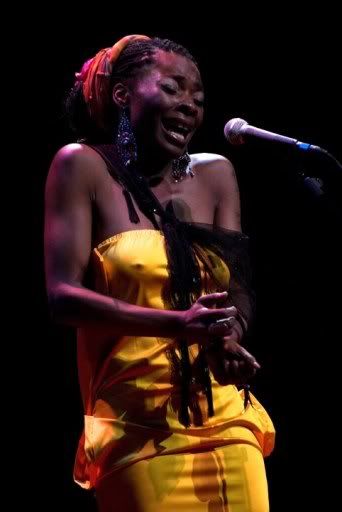 Sin remedio, el marBy DAVID CÁZARES
Sin remedio, el marBy DAVID CÁZARES
Miami | 07.17.2009Listening to music can be an exploration, a trip in which we discover new voices and sounds. Our best journeys bring us in touch with stellar talents we might not have noticed before, the kind of performers who build upon their musical heritage by creating new art.
Singer and songwriter Adriana Calcanhotto is one such artist, a performer who delivers sensitive lyricism with stellar musicianship in the best of Brazil’s musical tradition, much as singers Caetano Veloso and Marisa Monte have.
The fortunate in South Florida will have a chance to see Calcanhotto make her Florida debut on Saturday when she takes the stage at the Colony Theater in Miami Beach. The sold-out show follows her appearance last night at the Museum of Modern Art in New York, where Calcanhotto who is featured in the film Palavra Encantada (The Enchanted Word), performed solo with her guitar after a screening.
Calcanhotto, 43, is largely unknown outside of Brazil, where for the last two decades, where she has been a star in Musica Popular Brazileira or MPB, recording several successful albums, composing songs for television and making soundtracks for documentaries. She also created a new character for an album of children’s music, Adriana Partimpim, which won a Latin Grammy for best children’s album. A second volume will be released late this year.
In concert, she will perform a varied repertoire that includes classic Brazilian tunes and songs from Mare, a 2008 recording and the second in a trilogy of releases with music dedicated to the sea. The album, which follows her 1998 CD Maritimo, was produced by Arto Lindsay and features Veloso’s son Moreno Veloso backing her on guitar and vocals.
Well versed in Brazilian culture, Calcanhotto infuses her albums with her country’s poetry and its music, from samba and pop music to tropicalia, the rich blend of rock and Brazilian influences created in the 1960s by Veloso and Gilberto Gil, a movement of new popular music that drew on theater and poetry.
Calcanhotto is among those building on that earlier movement. She rose to prominence in the 1980s with a poetic version of MPB, itself a reaction against a rock ‘n’ roll craze. Since then she has taken a cerebral approach to music, producing albums that are thoughtful yet playful, gentle yet melancholy.
Her latest album includes originals and numbers by Veloso and another acclaimed composer, Dorival Caymmi. On some songs she writes music for the lyrics of other composers; for others, she writes lyrics for their music. Her voice is airy and distant as it is on the title cut:
One more time
The sea comes
To give itself
A landscape,
From arid to a mirageMonte makes a guest appearance on the album, singing background vocals on Porto Alegre (Nos Bracos de Calipso). On Sargazo Mar, composed by Caymmi, Calcanhotto is accompanied by Gil on guitar.
In Miami Beach, she will perform solo. But concert-goers will see a complete performer, one who writes melodies and meaningful songs that offer a refreshing take on MPB, said Gene de Sousa, development director for the Rhythm Foundation, which is sponsoring the concert.
«It’s good to see someone so original who is coming out with something as good as the 70s generation,» said de Souza, host of Café Brasil on WDNA 88.9 FM. «The whole genre was cemented by Caetano and later on by Marisa, but a lot of people have frozen their opinion of MPB and those artists. It’s evolved.»
|♫|PHOTO – Marcos Hermes

 It was a pairing of two extraordinary performers. Buika, born to parents from Equatorial Guinea, grew up on the Spanish island of Mallorca and is well-versed in flamenco, African music, jazz and soul. Lewis, who now lives in Spain, embodies Cuba’s musical tradition of agility and superb foundation. Their one-hour set largely featured selections from the singer’s most recent albums, Mi Niña Lola, recorded in 2007, and Niña de Fuego, released last year.
It was a pairing of two extraordinary performers. Buika, born to parents from Equatorial Guinea, grew up on the Spanish island of Mallorca and is well-versed in flamenco, African music, jazz and soul. Lewis, who now lives in Spain, embodies Cuba’s musical tradition of agility and superb foundation. Their one-hour set largely featured selections from the singer’s most recent albums, Mi Niña Lola, recorded in 2007, and Niña de Fuego, released last year.